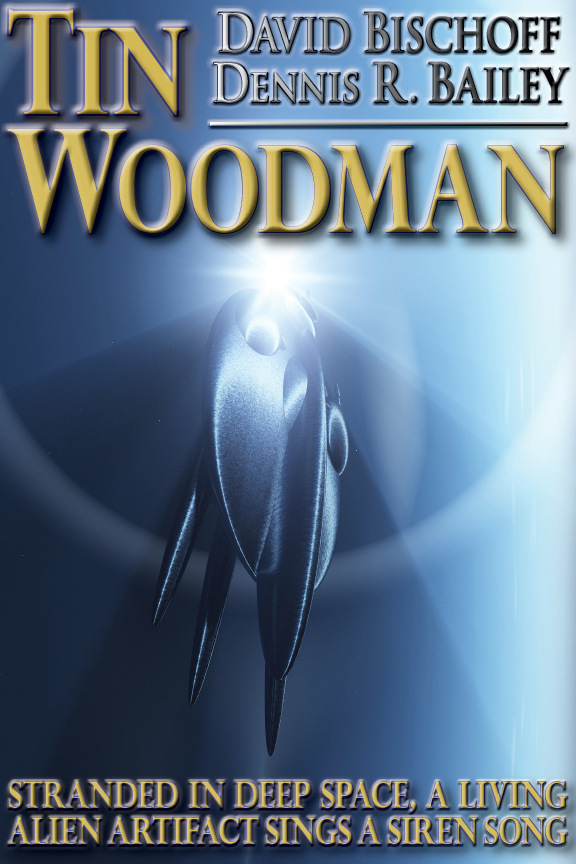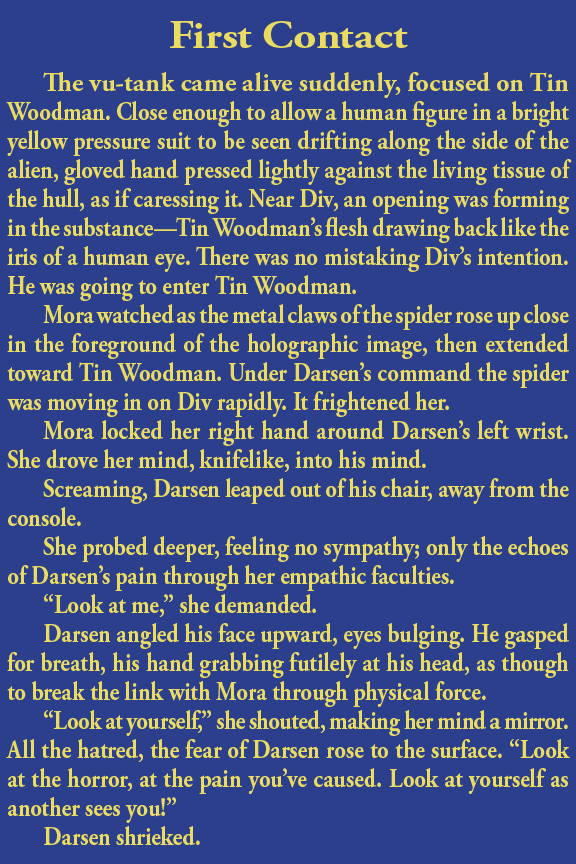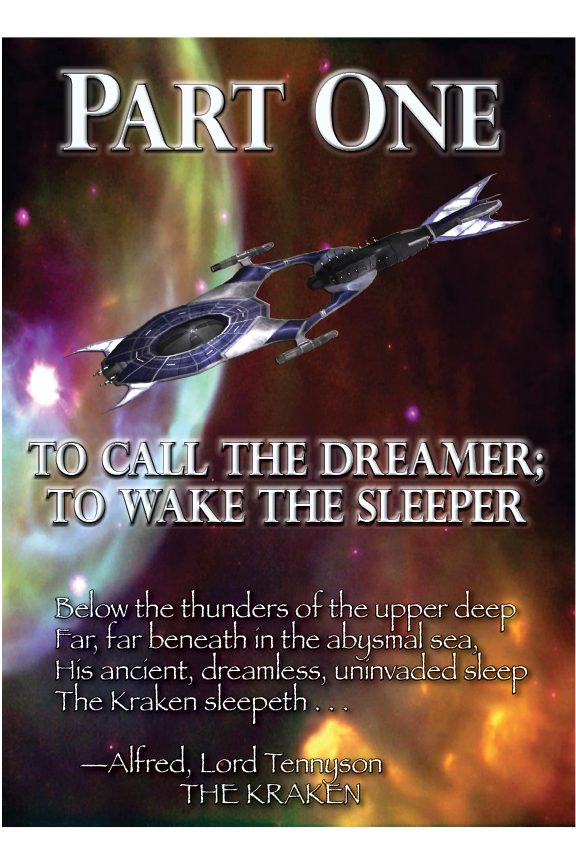Tin Woodman
Authors: David Bischoff,Dennis R. Bailey






ONE
North America A.D. 2385
The man disliked these old Earth places. But the boy was here; it was best to talk to Div Harlthor in the environment to which he was accustomed.
The Institute for Exceptional Children was a complex of squat, domed, windowless buildings huddled together, hugging the earth within the confines of Old University Park. Like giant iron-boled trees thrusting up, concealing a forest clearing, the towers of the city rose beyond the perimeter of the park. two kays eastward, the thousand-meter-high plasteel needle of the Control Tower marked the location of Phoenix Starport. On sunny mornings the daggerlike shadow of the tower’s upper levels cut a black swath across the grassy quadrangle of the institute’s mall. Generally, that specter was the only encroachment of the outside universe into the grounds and the affairs of the Old University complex.
The man considered this as he made his way across the grassy mall. It made him feel uneasy.
The role of intruder was not a part Assemblyman Bor Galvern thought he often played. With twenty years as chairman of the Committee of Territorial Exploration and Expansion, he had come to consider most of the known galaxy as part of his proper sphere of concern. Nonetheless, as he entered the office of Dr. Merton Severs, chief administrator of the institute, Galvern’s professional aplomb was at a low ebb.
As Galvern met him, he observed, that Dr. Severs shared certain characteristics with the institute he headed: smallness, neatness, colorlessness. His hair was short and tightly curled—a fashion ten years out of style, at least, as were the conservative gray business coveralls he wore, Severs was in unusual physical trim for a middle-aged city-dweller, however—a fact Galvern, a gray and grizzled old man of considerable bulk, noted with some envy. The doctor was apparently a man more concerned with function than appearance.
“I must admit that I had expected to be greeting most of your committee this morning,” said Severs, after exchanging pleasantries with the assemblyman.
Galvern smiled uneasily. “Trips to Earth lend themselves to junketing,” he joked. “Most of my colleagues won’t be in a mood to conduct the public’s business for at least another week. My personal aides are taking the grand tour of your facilities, in the company of one of your assistants.”
The truth of the matter, Galvern knew, was that his fellow assemblymen had no more desire than he to make this call—the difference being that
they
had been given a choice.
Some disappointment evident in his demeanor, Severs laughed politely. “I quite understand. Well, then, we may as well proceed with the main reason for your visit. Any explanations or information I have to offer will be much more meaningful after you’ve met Div.”
So saying, Severs led Galvern out of the administrative office bloc into the bare corridors and drab wardrooms which comprised the greater part of the institute. Here lived the many inmates for whom Severs and his staff cared. Galvern was interested in only one.
Div Harlthor.
When they finally reached his cubicle, Severs stopped, turned to Galvern. “I’m certain you’re aware of the necessity for careful behavior in the presence of someone like Div,” he cautioned. “Most particularly, at no time attempt to touch him.”
Galvern nodded agreement absently. Severs thumbed the door buzzer, the door slid open, and they entered Div’s room.
The young esper was reading, his spindly limbs poking up in an unaesthetic arrangement from behind a too-small desk. As Galvern and Severs approached him, Div glanced briefly up at them, his pink eyes startling in their size and depth. Galvern had the fugitive sensation of company inside his own skull.
“I’m sorry to disturb you, Div,” Severs began mildly. “This is—“
“Assemblyman Galvern, of the Triunion Grand Assembly,” the boy finished. He made no motion to welcome either of his visitors. He merely continued reading his book—
Finnegans Wake,
by James Joyce.
“His honor has come to Earth solely to see you,” prompted Severs.
“I know. He might have used the one-way viewing wall. That’s what it’s there for.”
“Yes, Div,” Severs continued patiently, obviously used to the boy’s recalcitrance. “I meant that he wished to speak with you.”
“I
know.”
Div shut his book reluctantly and turned his full attention to Galvern. With one pale, blue-veined hand, the telepath brushed his stiff red hair off his forehead.
A nervous sort of gesture,
Galvern thought. Yet he could sense that Div was anything but nervous in his presence. “I presume you also know
why
I wish to talk with you,” Galvern prodded.
“Of course.
Tin Woodman.
It consumes your thoughts,” Div replied. “Save those concerned with your fear of me.”
Galvern was shaken. “Look, son,” he said, moving around behind Div’s chair, fighting to stay calm. How did one deal with a Talent who knew every thought and feeling of everyone around him? Galvern knew very little about telepaths. But the government needed one—the best—and it had fallen to Galvern to find him.
Opting for a fatherly approach, Galvern reached out and placed a hand on the boy’s shoulder. “No,” Severs warned.
Too late.
An electric shock leaped up Galvern’s arm, into his lungs. He pulled his hand away with a shriek.
“I’m sorry,” Div said sincerely, “but that disturbs me. Dr. Severs should have warned you.”
“I did,” Severs muttered.
Angry and close to panic, Galvern groped for composure, tried to recover his dignity. “You are as adept as Dr. Severs promised.” His voice was an unmodulated, rasping croak. He grinned with embarrassment. “I presume that you have already absorbed all that I know concerning the unknown discovered by the starship
Pegasus?”
Div nodded. “None of your knowledge is very specific, however. If you intend for me to journey across space to deal with this—and I can see that this
is
your intention—I shall require all information on the discovery which has been relayed from the
Pegasus.”
Galvern was relieved. The request was surprisingly simple and straightforward. He reached into his tunic and produced a cassette. “This is designed to self-erase as it plays,” Galvern explained, “so you’ll only be able to view it once. When you arrive on board the
Pegasus,
however, you’ll have ample opportunity to review the information it contains.” He handed the recording to Div. “If you’ve no objection,” Galvern continued, watching Div examine the cassette with interest, “we can put you on a self-piloting Mark IV messenger ship within two days. It will be outfitted with a Null-R drive, of course, and should rendezvous with the
Pegasus
in less than two weeks. I understand you’ve never been into space.”
“No,” replied Div. “I look forward to it.” The confessional manner in which he said this caught Galvern off guard. Div spared him the necessity of replying by taking up his book again, his meaning unmistakable.
The audience was ended.
Div watched with relief as the two Normals exited. Neither could have been aware of how painful it had been for him, awash in the torrent of their emotional presences. They hated him, and he knew it.
I know them. I know them—and what do they think they’re hiding?
The thoughts came to his mind bearing the hot eruptions of emotions, the scalding, scarring waves of lava hate he had felt flowing over him from Normals.
Hide? From me? Hide the sun from a desert day? Hide water from a fish in the sea? I live in their thoughts when they’re close like a thought-bird flying through the skies of their minds—and they pummel me with their hail of hate, their rain of suspicion, their chilling wind-driven snow of necessity. Yes, yes, oh yes, they need me now, need me even though they think me a freak, dangerous, able to turn their skulls to glass to see through into their private little doubts nightmares secrets kept half-buried. I’m a Talent—the best, or the most warped—too good to kill or Dope but damn it so unpredictable that maybe the needle in the brain would be a relief except they need me. Like my parents saying that I was a deliverance, come to prophecy, to deliver the sights of my mind into the primitive coinage of their words and they prayed but when I told them loving them what they were what I saw they hit me not with hands but with their minds—monster, monster son of Satan, creature of the depths, Legion, oh, they were afraid of my mirror mind holding up the looking glass to their natures. I am Dangerous because they don’t understand that I mean no harm that I cannot help what I am that I am as human as they, that I need what humans need and without it I am—I am—I am a—
Freak.
Div hurled his book against the wall and very quietly began to cry.
Galvern was immensely relieved to be back in Severs’s office, away from Div. It read in the assemblyman’s face. Severs grimaced sympathetically as he seated himself behind his desk. “I told you it would be rough,” he said.
Galvern sank wearily into a recliner across from Severs. “I just hate making decisions about things I don’t understand.” He sighed. “Unfortunately, it’s one of the responsibilities of public office. For my own satisfaction, I had to at least
meet
the boy before I made up my mind.”
“I hope you found out whatever you wanted,” said Severs. “I still have no idea what’s going on. What is
Tin Woodman?”
“That’s classified information,” Galvern replied, reaching into his waist pocket. “But I’m getting too old for this secrecy nonsense.” He handed Severs a palm-sized vu-crystal. “This has a duplicate of the information on the tape I gave Div, in 3-D, though.”
Severs snapped it into the video-field projector on his desk, twisted a dimmer knob which lessened the room’s light, activated the crystaI.
A holographic image of a star system appeared in the center of the room, occupying a cubic meter of empty air. It was a double system, composed of a golden yellow star in orbit around a much larger, rose-pink companion. Four planets were discernible, all gas giants. None of them appeared, on brief observation, to be habitable. “Aldebaran system,” explained Galvern. “As the
Pegasus
first observed it. Edan Darsen in command.”
Severs was startled. “Darsen? I thought he was—”
“Cashiered?” Galvern shook his head, somewhat embarrassed. “The Board of Review overturned the ruling on his court-martial. Came to the conclusion that the deaths on Goridan were technically not his command responsibility. They demoted him, gave him a nice safe assignment collecting stardust. Standard starship run—one of our big multi-purpose cruisers hauling colonists about, and simultaneously examining those very unfamiliar areas of space. I gave you the name, didn’t I?”
“Yes. The
Pegasus.”
“Right. Anyway, we made Darsen its captain. Just to keep him out of trouble.”
“And he found some? Trouble, I mean.”
“Perhaps. Excuse me—I’ve got to adjust the picture. Watch this.” With a shimmer, the magnification of the holograph increased.
Now the main star nearly filled the viewing space. Near the star was
a tiny dark object, orbiting the primary. Another shimmer, and the pin point of darkness resolved into an object-apparently a spacecraft of sorts, but matching no configuration that Severs had ever seen.
“Designated object
Tin Woodman,”
Galvern announced.
“Why
‘Tin Woodman’?”
Severs asked, still confused as to the significance of the artifact.
“It’s from an old fairy tale. A man, made out of metal. Not a robot, but a living creature.” Galvern relaxed visibly, obviously enjoying Severs’s reaction. “There is no crew aboard
Tin Woodman
now, nor is it likely that there ever was. The ship itself is alive.”
“Carbon-based life?” Severs asked, watching the holograph in awed fascination.
“Basically, yes,” Galvern replied. “But the
Pegasus
has detected a structural latticework composed of metals, including steel, as well as synthetics. There are indications of a power generation unit capable of fueling a non-relative drive. And most important, there’s a large, and highly organized, central nervous system.” Galvern shook his head in mystification. “We don’t know where it came from. We don’t even know what keeps it alive.
Tin Woodman
is an enigma, to say the least.”
Severs was silent for several moments. “You’re absolutely certain of all this?” he asked at last.
“Absolutely,” confirmed Galvern. “The
Pegasus’
crew spent two days taking and rechecking sensor and scanner data before relaying their report. And we had perfect reception of all messages and telemetry.” He leaned forward toward the holograph and pointed at two dully pulsing metal globes embedded in the aft section of the ship-being. “These seem to be part of
Tin Woodman’s
propulsion system. We can’t be certain, because the creature doesn’t use them. Celestial mechanics hold it in orbit—it appears to be in some sort of torpor.” Galvern shrugged, reaching across the desk to turn the projector off. “The rest of the record is full of graphs, mathematical analyses—you know, technical data.
“The problem is this: To all appearances,
Tin Woodman
represents a level of technological and engineering sophistication far in advance of ours. Yet we cannot communicate with it. It doesn’t even seem to be aware of the
Pegasus’
presence. We therefore have no idea how long it has orbited Aldebaran, who built it—assuming it wasn’t just spawned out there—nor any idea how intelligent it is.”
Severs pondered this. “I don’t imagine conventional translation devices would be much use in this situation. We can’t have many literal concepts in common with a creature like this.”
“Precisely,” agreed Galvern. “The only means of communication the
Pegasus
crew hasn’t attempted is telepathy. Direct mind-to-mind contact. So we need Div.”
Severs drummed his fingers on the edge of his desk. “You saw him. You know he’s anything but stable emotionally.”
